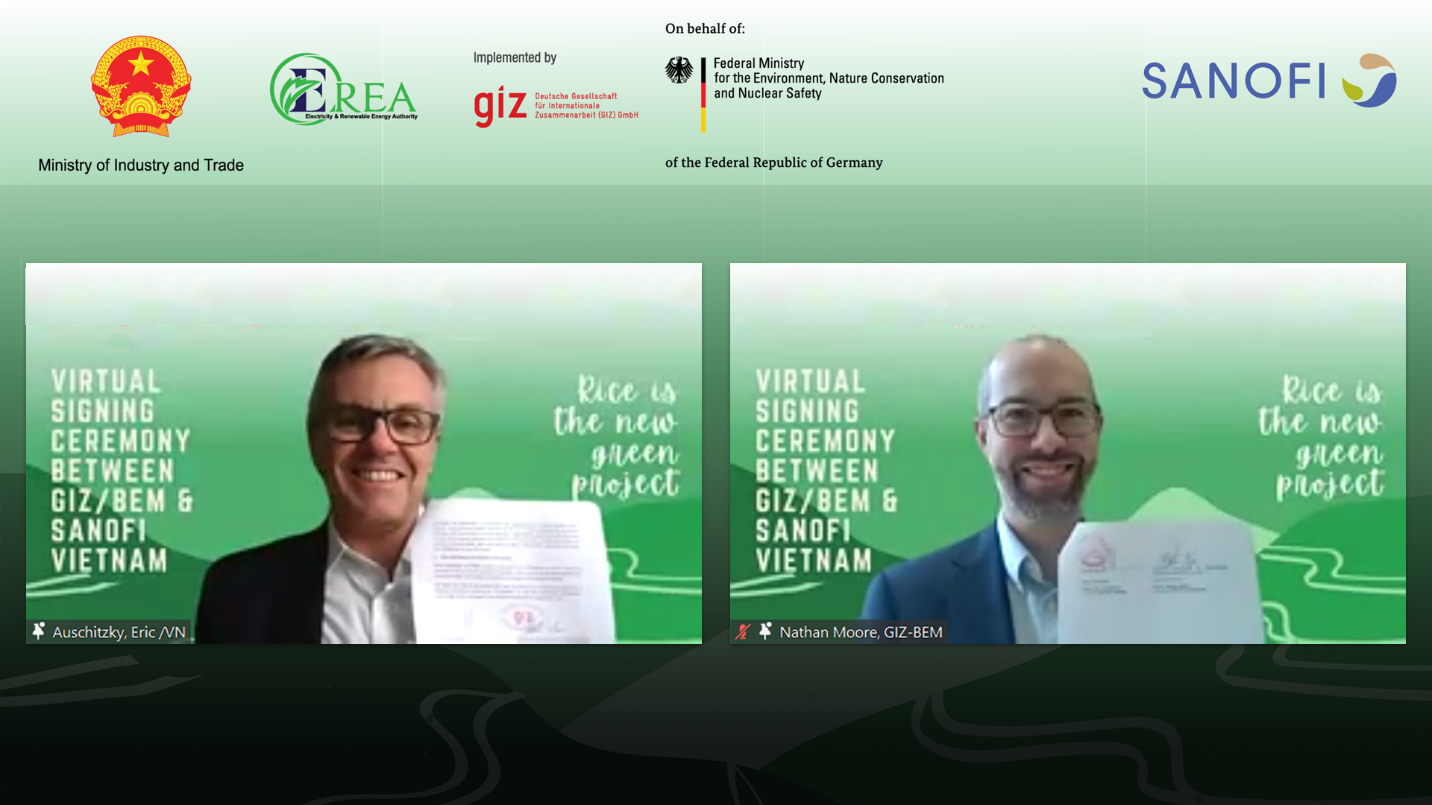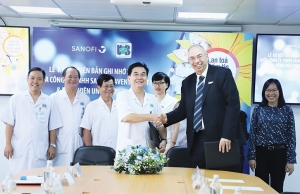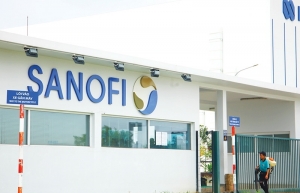Sanofi promotes environmental initiatives in Vietnam
 |
| Eric Auschitzky, head of Industrial Affairs at Sanofi Vietnam (manufacturing site) and Nathan Moore, director of GIZ’s BEM project in Vietnam at the online signing ceremony |
“Rice is the new green” is a project to develop sustainable rice husk biomass energy and is also the largest-scale project of its kind in Vietnam so far. The project, which is one of three environmental initiatives selected to be funded by the Planet Mobilization Fund by Sanofi Group, was prioritised by Sanofi Vietnam in an effort to become carbon neutral by 2025.
Eric Auschitzky, head of Industrial Affairs, Sanofi Vietnam (manufacturing site), said, “With long-term commitment to global environmental protection and ongoing development in Vietnam, Sanofi has made a remarkable attempt to minimise any potential impacts on the environment, including reducing plastic waste from factories, reducing the use of carton paper, and building an ecological garden on the premises.”
“Associating with GIZ’s BEM project, 'Rice is the new green' will definitely be an innovative and determined step by Sanofi Vietnam to become a pioneer in transforming and using renewable resources in the country. It will also further our ambition to be an ambassador for rice husk biomass evolution to other enterprises to take advantage of this plentiful green energy in Vietnam, heading towards a carbon-free future,” he added.
The industrial sector gains the highest growth rate and makes a major contribution to the Vietnamese economy. CO2 emissions to the environment reach a massive 300 million tonnes and undoubtedly keep climbing.
Likewise, Vietnam ranked fifth among the world’s largest rice producing countries with more than 10 billion tonnes of rice husk produced through the milling process each year. Rice husk is renewable and can be an alternative energy source replacing fossil fuels such as coal and oil. Additionally, the by-product of the combustion process of rice husk is ash with a high silica content which can be used as raw material for industries. Despite these benefits, rice husk has not been exploited and used sensibly.
With this signing ceremony to promote the “Rice is the new green” project, Sanofi Vietnam and the BEM project of GIZ are joining hands with the aim of converting the existing diesel fuel-fired boiler into a rice husk-fired boiler at Sanofi Vietnam factories to cut down the amount of waste and air pollution.
Through this project, Sanofi Vietnam is expected to reduce 2,300 tonnes of CO2 per year, reduce the cost of steam by 40 per cent, and especially use 100 per cent of rice husk biomass energy in production with the hope of promoting the sustainable development of Vietnam’s economy, society, and environment.
“'Rice is the new green' is a meaningful and creative project. Not only does it pioneer the use of clean energy in production, this project also exploits and utilises a great deal of rice husk resources which are quite abundant in Vietnam. This matches the objective of GIZ’s BEM project in Vietnam. With the professional support from GIZ’s BEM project and the great efforts of Sanofi, this project is expected to bring fruitful outcomes to the growth of the green industry ecosystem in Vietnam in the near future,” said Nathan Moore, director of GIZ’s BEM project in Vietnam during the ceremony.
 Bringing out the best in people at Sanofi Bringing out the best in people at Sanofi |
 Sanofi’s ambition to empower lives Sanofi’s ambition to empower lives |
 Digitalisation prompts evolution of healthcare Digitalisation prompts evolution of healthcare |
 Sanofi makes second run for EU-GMP recognition Sanofi makes second run for EU-GMP recognition |
What the stars mean:
★ Poor ★ ★ Promising ★★★ Good ★★★★ Very good ★★★★★ Exceptional
Related Contents
Latest News
More News
- Bac Ai Pumped Storage Hydropower Plant to enter peak construction phase (January 27, 2026 | 08:00)
- ASEAN could scale up sustainable aviation fuel by 2050 (January 24, 2026 | 10:19)
- 64,000 hectares of sea allocated for offshore wind surveys (January 22, 2026 | 20:23)
- EVN secures financing for Quang Trach II LNG power plant (January 17, 2026 | 15:55)
- PC1 teams up with DENZAI on regional wind projects (January 16, 2026 | 21:18)
- Innovation and ESG practices drive green transition in the digital era (January 16, 2026 | 16:51)
- Bac Ai hydropower works stay on track despite holiday period (January 16, 2026 | 16:19)
- Fugro extends MoU with PTSC G&S to support offshore wind growth (January 14, 2026 | 15:59)
- Pacifico Energy starts commercial operations at Sunpro Wind Farm in Mekong Delta (January 12, 2026 | 14:01)
- Honda launches electric two-wheeler, expands charging infrastructure (January 12, 2026 | 14:00)

 Tag:
Tag:























 Mobile Version
Mobile Version